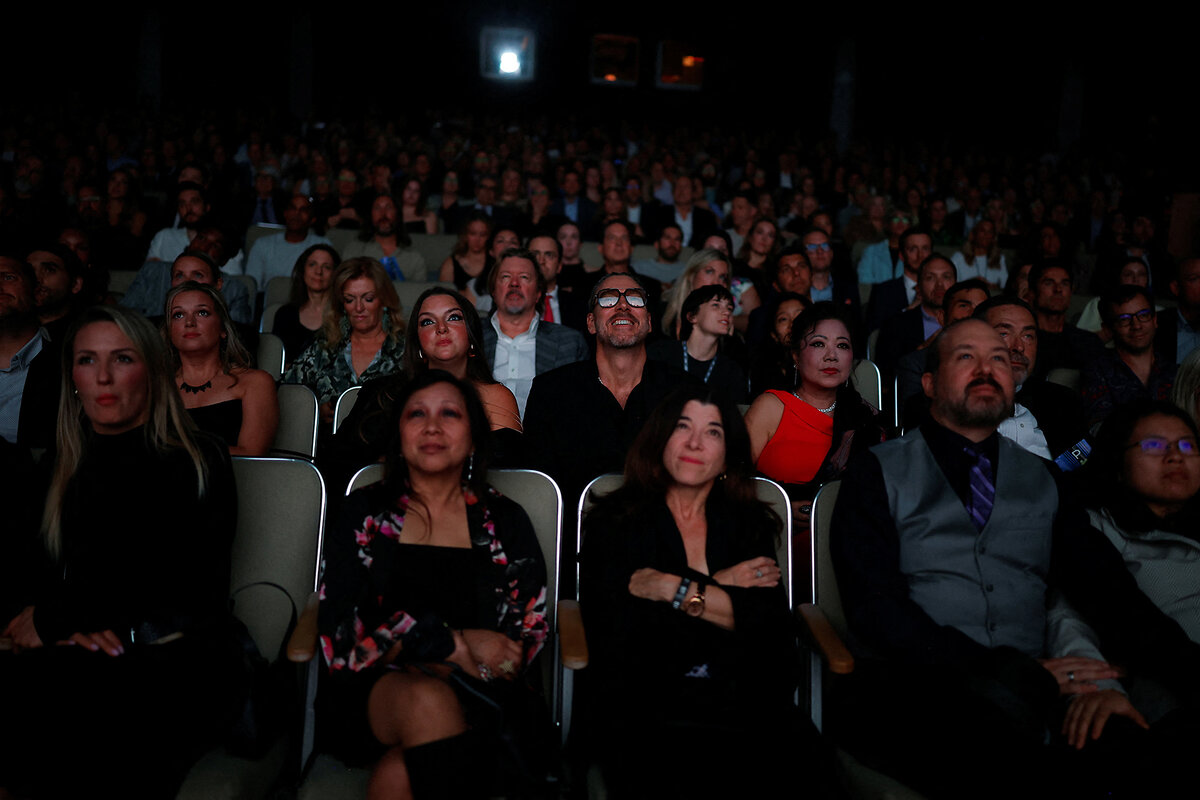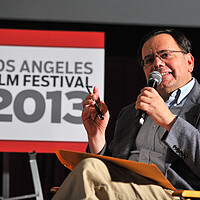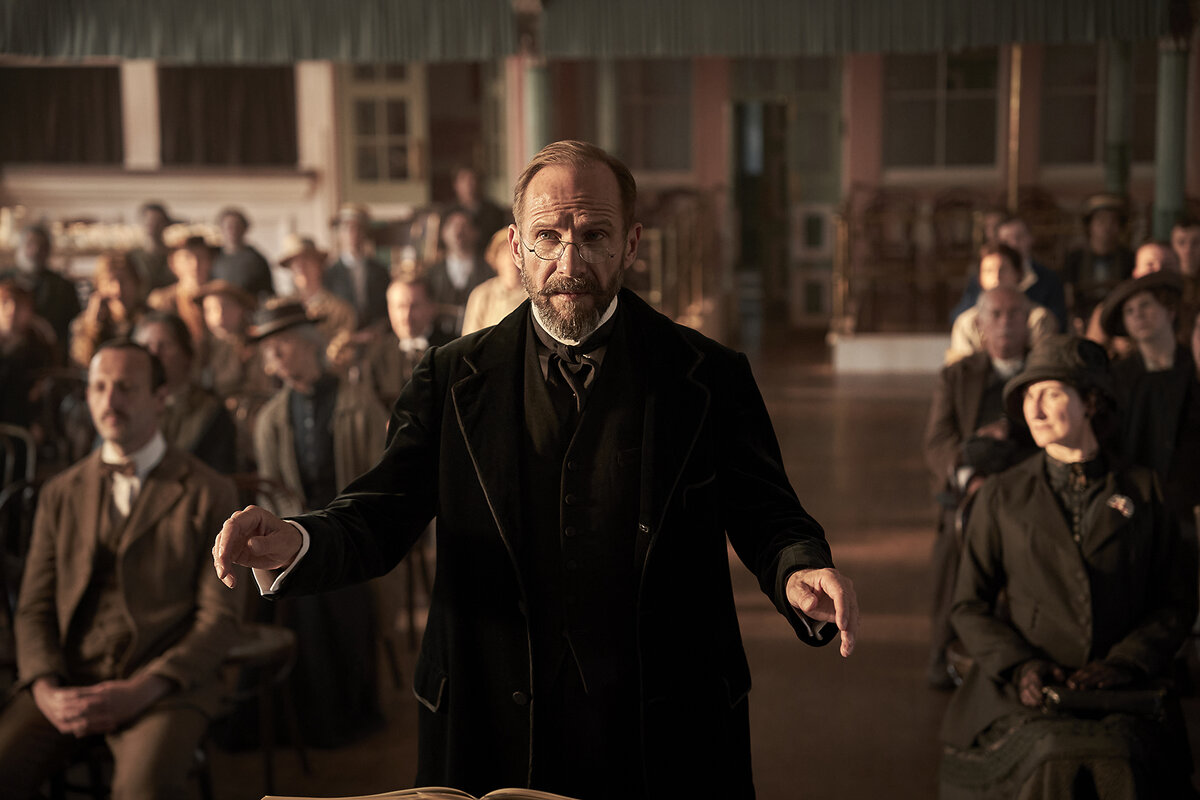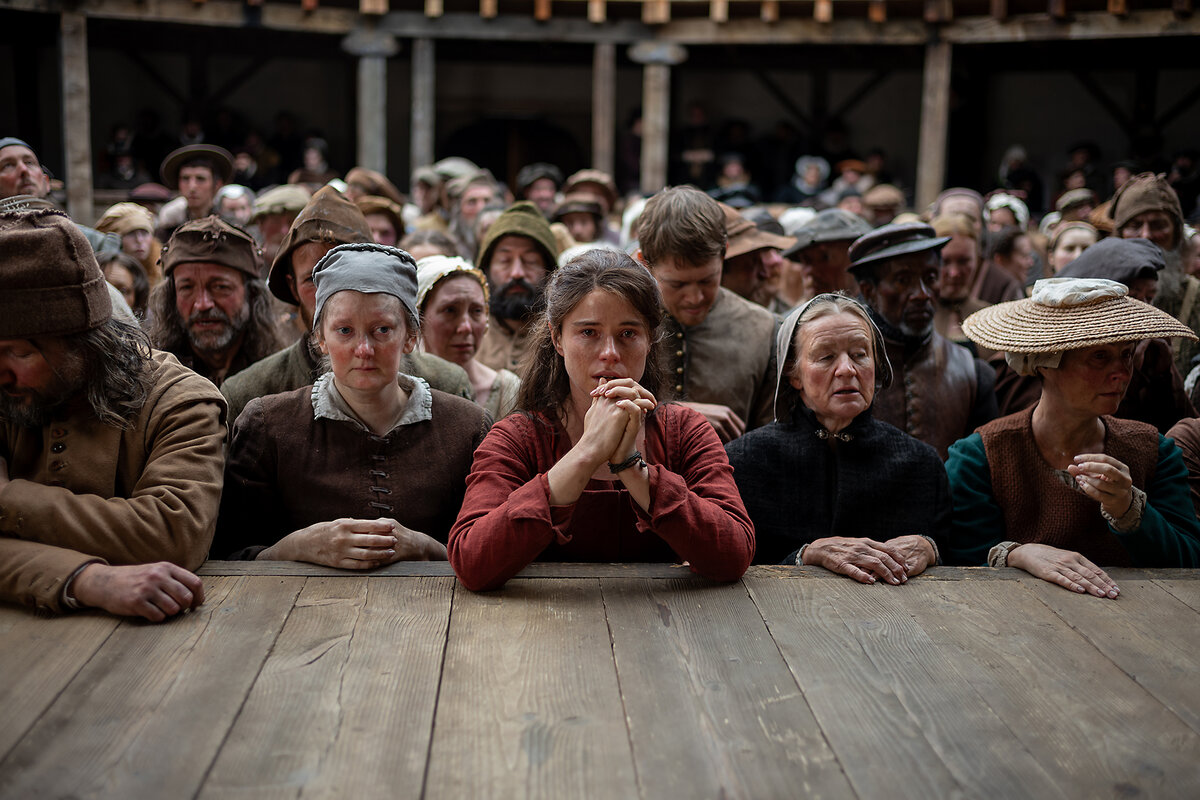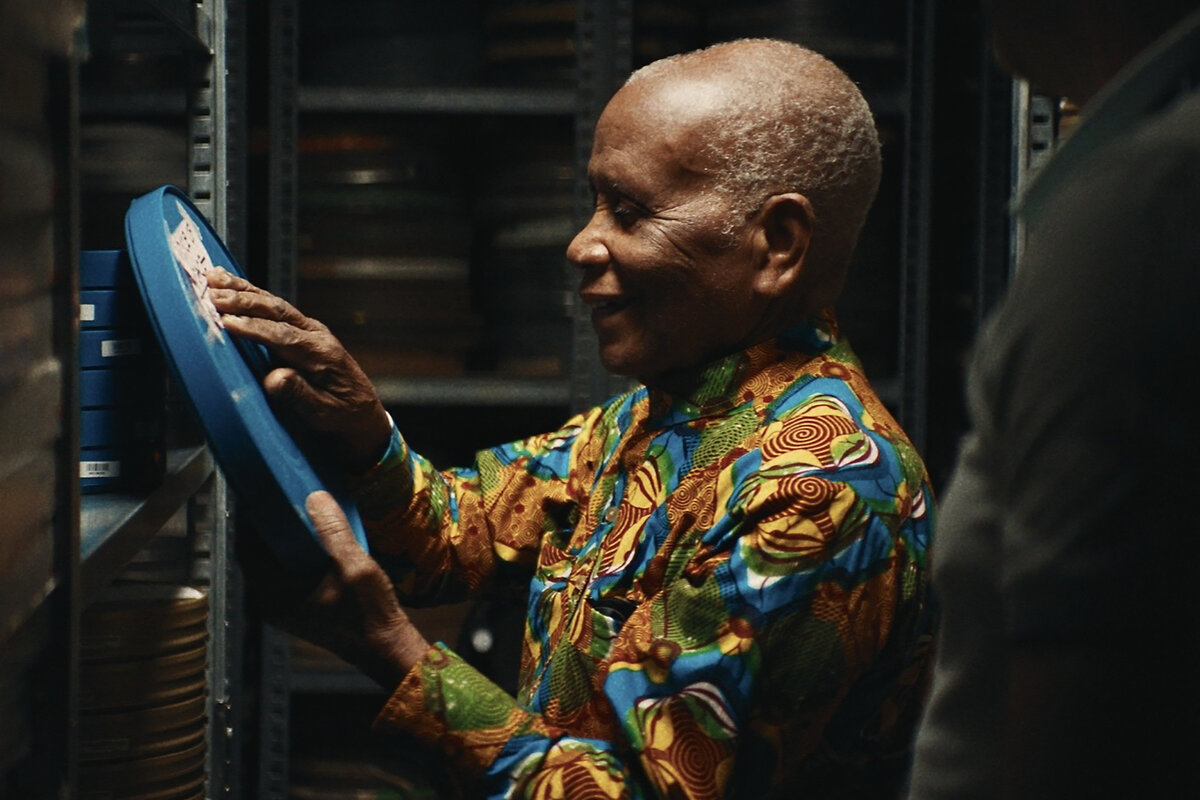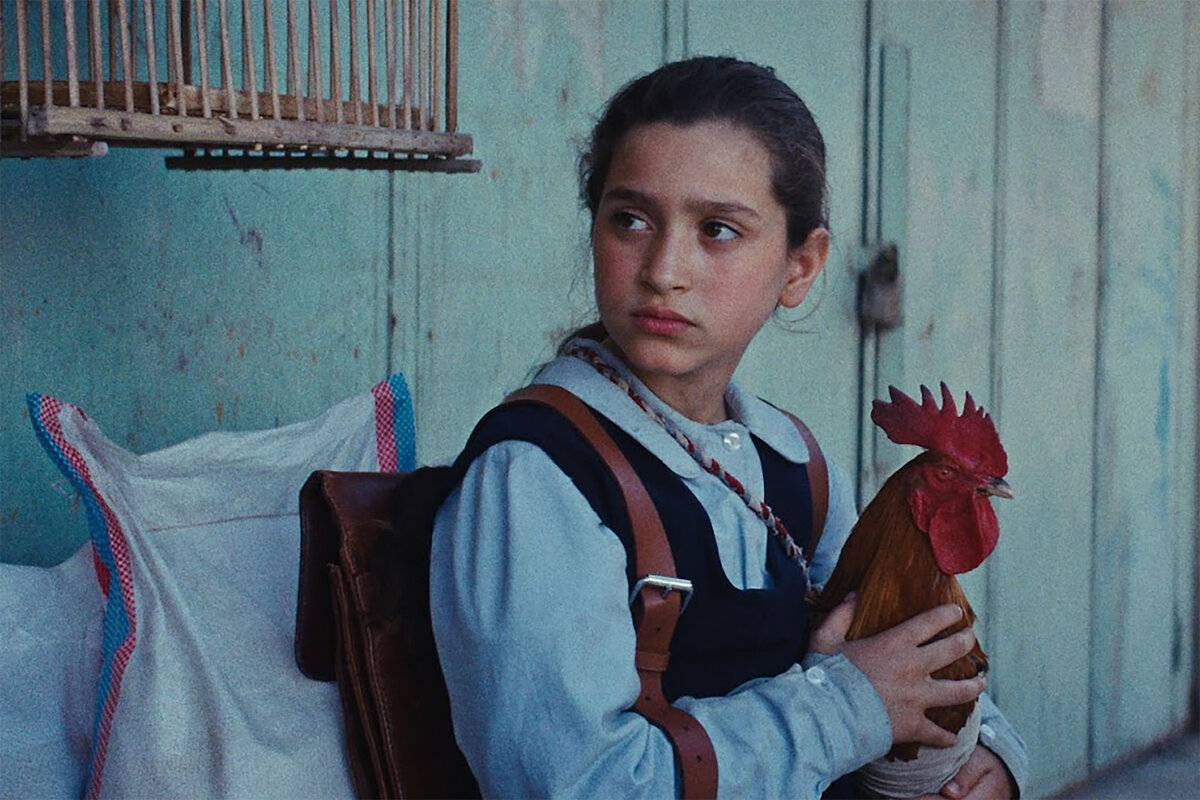Grab your popcorn and a seat. Toronto celebrates 50 years of moviegoing.
Loading...
| Toronto
Screening over 200 movies in 11 days, the Toronto International Film Festival is wrapping up its 50th anniversary. I’ve attended 25 of these pageants of full-blown cinemania.
A lot has happened to the movie business in the interim: the rising costs of production; the erosion of theatrical attendance, which predated the pandemic, largely because of streaming; the advent of technologies like artificial intelligence. What hasn’t changed, at least for true believers, are the movie-mad audiences willing to immerse themselves in the larger-than-life experience of seeing movies communally on the big screen.
This immersion is particularly evident at TIFF, North America’s largest film festival. Here, hundreds of moviegoers often line up for hours to see movies from all over the world that may never get a proper release afterward.
Why We Wrote This
At the 50th annual Toronto International Film Festival, our critic has watched more than 20 movies. His takeaway? “Movies – good, bad, or indifferent – can be a passport to global understanding.”
For me, TIFF highlights one of the great boons of the filmgoing experience: the opportunity to watch movies showcasing different cultures and ways of seeing. TIFF has more than its share of red carpet celebs and Oscar bait. But if I were to cite a single festival theme, it is that movies – good, bad, or indifferent – can be a passport to global understanding. I view TIFF as a cinematic guidebook, my own personal Baedeker.
Which is not to say that the festival neglects its Canadian roots. Not at all. The opening night premiere was the moving if uneven documentary “John Candy: I Like Me,” about the beloved Canadian comic actor, who died at 43 in 1994. British Columbia native and co-producer Ryan Reynolds, wearing a “Canada” T-shirt, introduced the film with director Colin Hanks. Then Prime Minister Mark Carney, well-versed in Candy’s filmography, took to the stage and said, “In many of his films, there’d be a scene ... where John would pivot, having been pushed too far.” Then he added, with a not so subtle reference to his counterpart down south, “Don’t push a Canadian too far.”
Of the more than 20 movies I saw at TIFF, probably the best upcoming film was the one I was most hoping would be good: “The Choral,” a comedy-drama starring Ralph Fiennes as a choirmaster in Yorkshire in 1916 when many of its men are being sent off to war. Fiennes has a way of underplaying that is far more eloquent than many an over-the-top emoter. The script is by Alan Bennett, one of the glories of British dramaturgy and a frequent collaborator with the film’s director, Nicholas Hytner (“The Madness of King George”). Simon Russell Beale all but steals the show in his cameo as the prickly British composer Edward Elgar. What a palpable pleasure the best British actors have for their profession!
Maybe the most talked-about movie was Chloé Zhao’s “Hamnet,” based on the Maggie O’Farrell novel imagining the death of William Shakespeare’s 11-year-old son, Hamnet, and its effect on his parents, played by Paul Mescal and Jessie Buckley. In this rendering, the Bard’s bride is the free-spirited firebrand, Agnes, rather than his real-life wife. The film makes much of the fact that Shakespeare wrote “Hamlet” directly after his son’s death. The parallels drawn between the real-life and the onstage tragedy struck me as facile, but Buckley’s performance, in particular, is shattering. And I don’t think I’ve ever heard quite so much sniffling in a movie theater. The critic seated next to me was sobbing uncontrollably. Afterward, she apologized and I told her no need to. It’s not like she was the only one.
Confusingly, there was also a “Hamlet” at TIFF, set in the South Asian community of modern-day London. Elsinore is now a family mansion in the English countryside. With unrelenting ferocity, Riz Ahmed plays the Prince of Denmark, a role he has long coveted. To my surprise and delight, the actors all speak Shakespeare’s lines. The modernization, while not always successful, never loses sight of the play, not even when Hamlet is reciting “To be or not to be” while gripping the wheel of his car as he hurtles down the highway.
Agnieszka Holland’s disjointed, kaleidoscopic “Franz,” about the visionary Czech novelist Franz Kafka, is no one’s idea of a standard biopic. For much of the way I kind of wished it had been. But Idan Weiss, the actor playing Kafka, is such a dead ringer for the great author that the effect is, well, Kafkaesque. Speaking of Kafka to the trade journal , Holland, whose last film was the searing Ukraine immigration drama “Green Border,” said, “Unfortunately today, his vision of society, where law is arbitrary and the individual doesn’t matter, is very relevant.”
Several documentaries especially stood out for me. Oscar-winning Canadian director Ben Proudfoot’s “The Eyes of Ghana,” which has the imprimatur of Barack and Michelle Obama’s production company Higher Ground, focuses on Chris Hesse, now in his 90s. Hesse was the personal cameraman in the 1950s and 1960s to Ghana’s revolutionary leader Kwame Nkrumah. Hesse regarded his cinematography as a way to release to the world a true and anti-colonialist depiction of Africa. His goal now is to rescue the over 1,300 reels of footage discarded in a London warehouse after Nkrumah’s fall. The excerpts of that footage shown here are revelatory and could well alter the historical assessment of those years.
Few documentaries have captured as vividly as “Love+War” what it’s like to be a photojournalist under fire. Pulitzer Prize-winning Lynsey Addario has been filming in combat zones all over the world for decades. This wife and mother of two boys sees her work as a mission to reform the world. She says in the film: “There is something bigger than us and it takes over and becomes your life, becomes your responsibility.” The movie is ultimately about what one is willing to die for.
There was much else that I responded to at TIFF. Richard Linklater had two films, both worthy: “Nouvelle Vague,” about the filming of Jean-Luc Godard’s classic debut, “Breathless,” with look-alike actors playing Jean-Paul Belmondo, Jean Seberg, and many others, is a cineaste treat. “Blue Moon,” starring Ethan Hawke as the great, besotted Broadway lyricist Lorenz Hart, will perk up showbiz aficionados. Count me among them. Jafar Panahi’s Palme d’Or winner at Cannes, “It Was Just an Accident,” is a drama about the repercussions of the tortuous regime in Iran that Panahi himself, now intermittently based abroad, suffered through. It’s one of his best.
The most welcome surprise was Hasan Hadi’s Cannes prize-winning drama “The President’s Cake,” set in 1990s Iraq at a time when the starving populace was required to annually celebrate Saddam Hussein’s birthday. Little Lamia (Baneen Ahmad Nayyef) is required to bake a cake for him even though her remote village lacks the ingredients. Her journey, accompanied by her pet rooster, is allegorical without ever losing sight of that era’s harsh reality. It’s a child’s eye view of turmoil and resilience that made me aware once again of how exhilarating a movie can be when it takes you to places you might never have imagined and will never forget.
Peter Rainer is the Monitor’s film critic.






